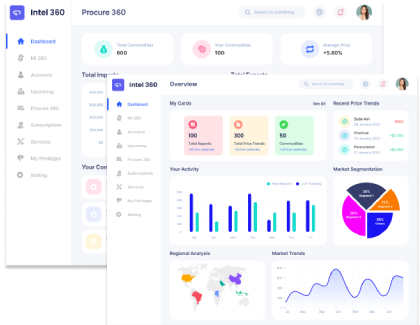Manufacturing, accommodation and food services, wholesale and retail trade, and real estate, business and administrative activities are all affected by COVID-19, according to the International Labour Organisation. Manufacturing is expected to be one of the most negatively impacted industries in terms of economic impact.
Also Read, Impact of COVID-19 on the Global Retail and Manufacturing Market
The virus's impact on the component manufacturing sector has been significant, as it has shut down production and factory operations in the automotive, electronics, aerospace, and other industries. China, which was the initial epicentre of the pandemic, is the global hub for the supply of raw materials to global companies, affecting the entire supply chain for manufacturing companies in order to follow lockdown, social distancing, and prevent coronavirus spread measures suggested by the local government.
Over 75% of the world's businesses are estimated to be in direct or indirect contact with China for the procurement of raw materials, and nearly 950-1000 companies have tier 2 suppliers in China. Besides which, the United Nations Conference on Trade and Development (UNCTAD) predicted that global foreign direct investment (FDI) would fall due to a drop in manufacturing company operations as a result of factory shutdowns.
The countries that rely on the partnered countries for raw materials in the pharmaceutical industry have been severely impacted by the virus's spread, which has caused a halt in the supply of all products between the two countries. For example, the United States of America is dependent on Asian companies for pharmaceutical and medical device raw materials and is now facing high risks in securing these materials. China is currently the world's leading producer and supplier of active pharmaceutical ingredients (API). Around 80% of Indian APIs are produced by Chinese companies, while the Chinese produce 13% of medical supplies in the United States.
The COVID-19 pandemic also had a significant impact on the electronics industry, as China accounts for nearly 85% of the total value of components used in smartphones and nearly 75% in the case of televisions. All critical components are imported from China, including printed circuit boards, mobile displays, LED chips, memory, open cell TV panels, and capacitors. The COVID-19 pandemic forced the majority of Chinese factories to close. As a result of the shortage of supplies caused by the factory shutdown, Chinese vendors increased component prices by nearly 2-3%. This had a negative impact on the global electronics manufacturing sector.
In 2020, the manufacturing industry in the United States experienced a significant downturn. Light vehicle production fell nearly 38.6% in the first half of 2020 compared to the same period last year, while raw steel capacity utilisation remained in the mid-50s versus being in the 80s in 2019.
Most automobile and electronics manufacturers in Europe temporarily closed their factories or reduced production output, resulting in a loss to global trade. Daimler and Volkswagen, for example, had temporarily halted vehicle and engine production at their European factories in 2020 to combat the COVID-19 outbreak. The closure of factories by major automobile manufacturers resulted in a significant loss of automobile production, which impacted the European automobile sector. Fiat Chrysler Automobiles, Ford Motor Company, Samsung Electronics Co., Ltd., BASF SE, and Boeing Co. are among the companies affected by the coronavirus outbreak. Some of these companies have also relocated their manufacturing facilities to countries with fewer COVID-19 cases. For example, in March 2020, Samsung Electronics Co., Ltd. announced that it would shift some of its domestic smartphone production to Vietnam in response to the fastest growth in the spread of coronavirus in South Korea. This was done to reduce the risk of coronavirus affecting the company's smartphone manufacturing operations.
Restrictions imposed as a result of the increase in COVID-19 cases resulted in a massive slowdown in India's manufacturing sector. The IHS Markit India Manufacturing Purchasing Managers' Index (PMI) fell to a seven-month low of 55.4 in March 2021, down from 57.5 in February 2021. Data for April 2021 show a slight improvement to 55.5 after falling to a seven-month low of 55.4 in March.
The increase in COVID-19 cases may further dampen demand at a time when firms' financials are already vulnerable to rising global prices. India's GDP contracted by 23.9% in the first quarter of 2020-21, and the manufacturing sector's share of total gross value added (GVA) fell from 17.5% in the first quarter of 2019-20 to 13.8% in this quarter. Manufacturing production cuts had a rippling negative impact on the component industries, primarily halting operations of MSMEs engaged in small and spare parts manufacturing.
According to a survey conducted by the United Nations Industrial Development Organization (UNIDO), manufacturing in India ceased after the lockdown was imposed last year, with the exception of the rice milling sector, where production reportedly dropped by half. Metals and chemical products, motor vehicles, machinery and equipment, textiles, and other manufacturing industries have been particularly hard hit.
The automobile industry, which was dealing with the new Bharat Stage (BS) VI regulations, faced a shortage of spare parts from China, where factories had been closed due to the coronavirus outbreak. According to a parliamentary panel report, the Indian automotive industry lost Rs 2,300 crore per day, with an estimated 3.45 lakh job losses as a result of the pandemic. All the major original equipment manufacturers (OEM) had cut down their production by 18-20% due to low demand and decline in sales of vehicles.
The IHS Markit Manufacturing Purchasing Managers' Index (PMI) increased to 55.3 in July from 48.1 in June, well above the 50-point threshold that separates growth from contraction. Factory activity fell in June for the first time in 11 months. Output increased at a rapid pace, with more than one-third of companies reporting a monthly increase in output, owing to a rebound in new business and the relaxation of some local COVID-19 restrictions.
As vaccine distribution expands, an increase in factory output activity may indicate that the global economy will continue to recover later in 2021. Assuming that vaccine rollouts can boost service sector growth alongside a sustained strong manufacturing sector, the global manufacturing sector should see a robust recovery in the second half of the year.
Despite the current disruption, the outlook remains relatively positive on average. Even with the shortages for at least a few more quarters, new regulations on the horizon that will make it difficult for businesses to meet climate change targets, and global trade relations remain tense, the key factor driving the outlook remains high. With a globally synchronised demand recovery underway, expectations are for a strong 2021 followed by fading growth as countries revert to previous demand trends. Though a weaker recovery in 2021 may be due to ongoing supply chain issues that have disproportionately impacted global auto production.
Digital investments can assist in addressing the ongoing challenges of dealing with unknown disruptions. Manufacturers can respond to the pandemic's disruptions and build resilience that will allow them to thrive by continuing to invest in digital initiatives across production and the supply network, as well as making strategic investments in reskilling their workforce such as robots and cobots.























Share